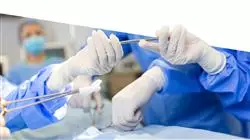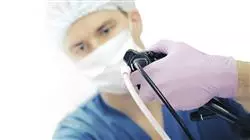University certificate
The world's largest faculty of medicine”
Introduction to the Program
You will handle the computed tomography procedure and create much more detailed images with X-rays"

The hepato-bilio-pancreatic area is presented as a vital area for the functioning of the body, but its anatomy is complex and sometimes its anatomical evaluation by radiological and endoscopic tests is difficult. Eighty percent of hepatobiliopancreatic surgeries are performed by minimally invasive surgery, resulting in less postoperative pain, less blood loss and shorter hospital stay. To this end, it is vital for specialists to be at the forefront of the most innovative procedures, providing the most accurate diagnoses and applying the safest treatments for patients.
Surgeons face the constant challenge of combining the updating of their knowledge with the improvement of their technical skills. In view of this, TECHhas created a complete Professional master’s degree, through which students will have access to the most updated contents in pancreatic, hepatic and biliary pathology. Throughout this study plan, emerging technologies (abdominal ultrasound or magnetic resonance imaging), used for diagnostic imaging of hepatic focal lesions will be addressed.
Likewise, the classification of less frequent liver tumors (such as hepatoblastomas) will be studied in depth in order to contribute to early diagnosis and promote scientific research. The most up-to-date procedures, such as the laparoscopic technique and robotic surgery, will also be discussed. In this sense, these contemporary therapeutic approaches will enable graduates to make informed decisions and consider multidisciplinary treatment options.
In addition, the methodology of this program reinforces its innovative character. TECHoffers a 100% online educational environment, tailored to the needs of busy professionals seeking to advance their careers. It also employs the Relearning methodology, based on the repetition of key concepts to fix knowledge and facilitate learning. In this way, the combination of flexibility and a robust pedagogical approach makes it highly accessible.
You will diagnose the least common epithelial tumors with the best digital university in the world, according to Forbes”
This Professional master’s degree in Hepatobiliopancreatic Surgery contains the most complete and up-to-date scientific program on the market. The most important features include:
- The development of practical cases presented by experts in Hepatobiliopancreatic Surgery
- The graphic, schematic, and practical contents with which they are created, provide scientific and practical information on the disciplines that are essential for professional practice
- Practical exercises where the process of self-assessment can be used to improve learning
- Its special emphasis on innovative methodologies
- Theoretical lessons, questions to the expert, debate forums on controversial topics, and individual reflection assignments
- Content that is accessible from any fixed or portable device with an Internet connection
You will achieve your goals thanks to TECH's didactic tools, including explanatory videos and interactive summaries"
The program’s teaching staff includes professionals from the field who contribute their work experience to this educational program, as well as renowned specialists from leading societies and prestigious universities.
The multimedia content, developed with the latest educational technology, will provide the professional with situated and contextual learning, i.e., a simulated environment that will provide immersive education programmed to learn in real situations.
This program is designed around Problem-Based Learning, whereby the professional must try to solve the different professional practice situations that arise during the academic year For this purpose, the students will be assisted by an innovative interactive video system created by renowned and experienced experts.
You will perform the most complete ultrasound scans with the help of ultrasonic probes. And in only 12 months!"

You will detect upper gastrointestinal bleeding in order to apply the most appropriate primary prophylaxis, according to your personal needs"
Why study at TECH?
TECH is the world’s largest online university. With an impressive catalog of more than 14,000 university programs available in 11 languages, it is positioned as a leader in employability, with a 99% job placement rate. In addition, it relies on an enormous faculty of more than 6,000 professors of the highest international renown.

Study at the world's largest online university and guarantee your professional success. The future starts at TECH”
The world’s best online university according to FORBES
The prestigious Forbes magazine, specialized in business and finance, has highlighted TECH as “the world's best online university” This is what they have recently stated in an article in their digital edition in which they echo the success story of this institution, “thanks to the academic offer it provides, the selection of its teaching staff, and an innovative learning method aimed at educating the professionals of the future”
A revolutionary study method, a cutting-edge faculty and a practical focus: the key to TECH's success.
The most complete study plans on the university scene
TECH offers the most complete study plans on the university scene, with syllabuses that cover fundamental concepts and, at the same time, the main scientific advances in their specific scientific areas. In addition, these programs are continuously being updated to guarantee students the academic vanguard and the most in-demand professional skills. In this way, the university's qualifications provide its graduates with a significant advantage to propel their careers to success.
TECH offers the most comprehensive and intensive study plans on the current university scene.
A world-class teaching staff
TECH's teaching staff is made up of more than 6,000 professors with the highest international recognition. Professors, researchers and top executives of multinational companies, including Isaiah Covington, performance coach of the Boston Celtics; Magda Romanska, principal investigator at Harvard MetaLAB; Ignacio Wistumba, chairman of the department of translational molecular pathology at MD Anderson Cancer Center; and D.W. Pine, creative director of TIME magazine, among others.
Internationally renowned experts, specialized in different branches of Health, Technology, Communication and Business, form part of the TECH faculty.
A unique learning method
TECH is the first university to use Relearning in all its programs. It is the best online learning methodology, accredited with international teaching quality certifications, provided by prestigious educational agencies. In addition, this disruptive educational model is complemented with the “Case Method”, thereby setting up a unique online teaching strategy. Innovative teaching resources are also implemented, including detailed videos, infographics and interactive summaries.
TECH combines Relearning and the Case Method in all its university programs to guarantee excellent theoretical and practical learning, studying whenever and wherever you want.
The world's largest online university
TECH is the world’s largest online university. We are the largest educational institution, with the best and widest online educational catalog, one hundred percent online and covering the vast majority of areas of knowledge. We offer a large selection of our own degrees and accredited online undergraduate and postgraduate degrees. In total, more than 14,000 university degrees, in eleven different languages, make us the largest educational largest in the world.
TECH has the world's most extensive catalog of academic and official programs, available in more than 11 languages.
Google Premier Partner
The American technology giant has awarded TECH the Google Google Premier Partner badge. This award, which is only available to 3% of the world's companies, highlights the efficient, flexible and tailored experience that this university provides to students. The recognition as a Google Premier Partner not only accredits the maximum rigor, performance and investment in TECH's digital infrastructures, but also places this university as one of the world's leading technology companies.
Google has positioned TECH in the top 3% of the world's most important technology companies by awarding it its Google Premier Partner badge.
The official online university of the NBA
TECH is the official online university of the NBA. Thanks to our agreement with the biggest league in basketball, we offer our students exclusive university programs, as well as a wide variety of educational resources focused on the business of the league and other areas of the sports industry. Each program is made up of a uniquely designed syllabus and features exceptional guest hosts: professionals with a distinguished sports background who will offer their expertise on the most relevant topics.
TECH has been selected by the NBA, the world's top basketball league, as its official online university.
The top-rated university by its students
Students have positioned TECH as the world's top-rated university on the main review websites, with a highest rating of 4.9 out of 5, obtained from more than 1,000 reviews. These results consolidate TECH as the benchmark university institution at an international level, reflecting the excellence and positive impact of its educational model.” reflecting the excellence and positive impact of its educational model.”
TECH is the world’s top-rated university by its students.
Leaders in employability
TECH has managed to become the leading university in employability. 99% of its students obtain jobs in the academic field they have studied, within one year of completing any of the university's programs. A similar number achieve immediate career enhancement. All this thanks to a study methodology that bases its effectiveness on the acquisition of practical skills, which are absolutely necessary for professional development.
99% of TECH graduates find a job within a year of completing their studies.
Professional Master's Degree in Hepatobiliopancreatic Surgery
Hepatobiliopancreatic surgery, also known as HPB surgery, emerges as a specialized discipline dedicated to the treatment of pathologies related to the liver, biliary tract and pancreas. Would you like to obtain the necessary tools to specialize in this field? TECH Global University has the ideal option for you. The Professional Master's Degree in Hepatobiliopancreatic Surgery is the key to take your career to the next level. Designed for physicians committed to excellence, this program, taught 100% online, will immerse you in the latest advances, innovative surgical techniques and comprehensive management of hepatobiliopancreatic pathologies. With our training, you will not only gain advanced knowledge, but you will become a leader at the forefront of surgery. From complex hepatic resections, to pancreatic procedures, the program prepares you to tackle a variety of challenging clinical cases
The program prepares you to tackle a variety of challenging clinical cases.
Learn about hepatobiliopancreatic surgery
Through 100% online education, we offer you the opportunity to earn a world-class program, accessing self-managed classes, innovative multimedia content and mentorship with an experienced faculty. Stay at the forefront of hepatobiliopancreatic surgery by exploring the latest trends and technological advances in the field. From the application of minimally invasive techniques, to the use of advanced imaging technologies, you'll be prepared to integrate the latest innovations into your clinical practice. As you progress through the program, you will learn to conduct clinical research and contribute to the advancement of medical science in the field of hepatobiliopancreatic surgery. In addition, you will develop critical skills to analyze scientific literature and apply practice-based evidence in your clinical setting. Finally, you will acquire advanced surgical skills specific to interventions in the liver, biliary tract and pancreas. Want to learn more? Make the decision and enroll now, by doing so, you will be part of the largest digital academic community in the world.We are waiting for you!







